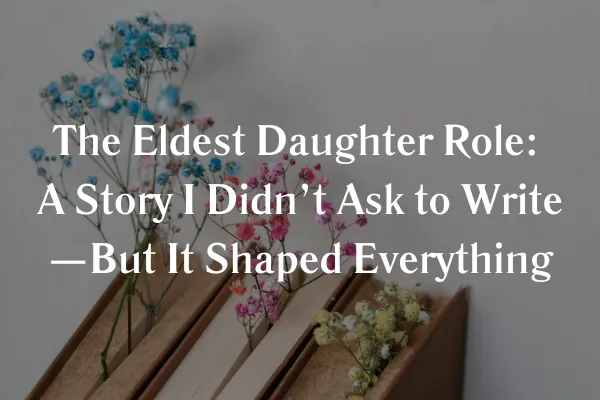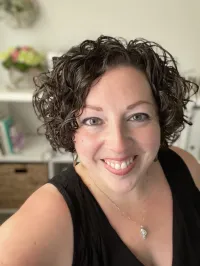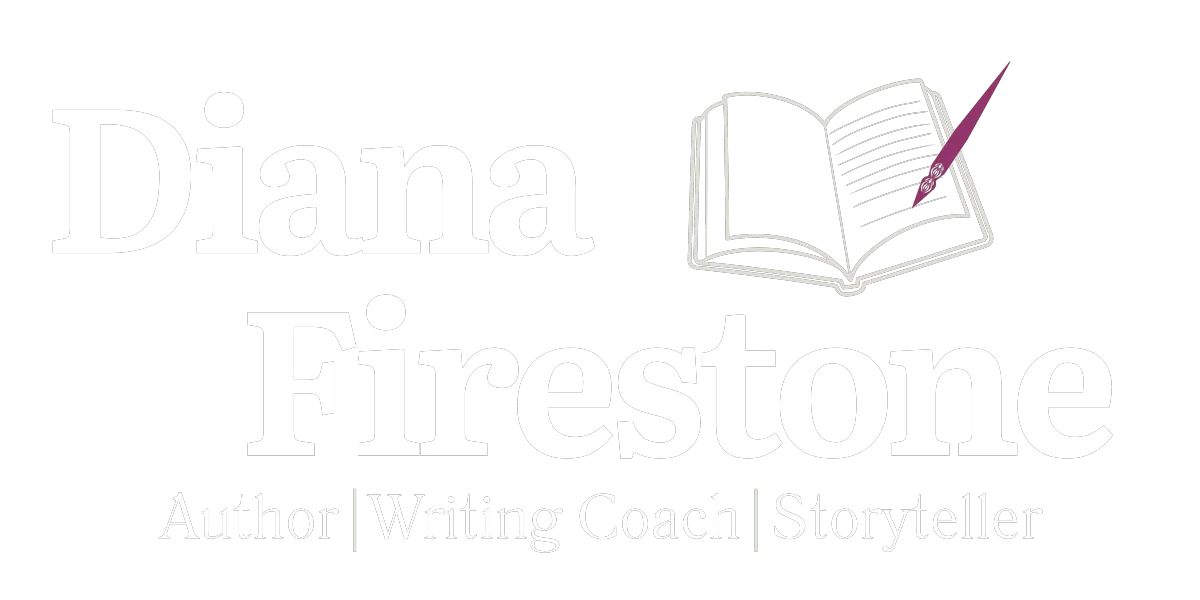Diana Tells Stories
A home for book lovers, storytellers, and anyone on a journey to find their voice. Here, you’ll find deep-dive storytelling reflections, poetry, book reviews, and writing tips
designed to inspire creativity and make writing feel less like a chore and more like an adventure.
A blog for storytellers...
Poetry, reflections, book reviews, and writing tips—because every story deserves to be told.

Eldest Daughter Role
The Eldest Daughter Role: A Story I Didn’t Ask to Write—But It Shaped Everything
Growing up, I never questioned the role I played in my family. The fixer. The overthinker. The responsible one, or at least the outward portrayal of responsibility. The one who made sure everyone had what they needed, even if it meant putting myself last. It wasn’t a choice; it was just what needed to be done. If you’re the eldest daughter—or you’ve ever felt the weight of being the one others rely on—you know exactly what I mean.
But here’s something I didn’t realize until much later: this role didn’t just shape my life—it shaped my writing.
Whether I’m crafting poetry, working on a story, or even writing this blog, I see the same themes appearing over and over again. Characters who carry too much, who struggle to ask for help, who feel responsible for things they can’t control. My words carry the same weight I’ve carried my whole life.
And I know I’m not alone in this.
So today, I’m diving into how identity, family roles, and life experiences shape the stories we tell—whether we realize it or not.
The umbrella disclaimer here: It’s no one’s fault, nor do I blame anyone for being the eldest daughter. I am who I am because of it and all the tough as women who came before me and did the same thing. It’s not perfect or easy, but it’s my story and I own this shit.
What it Means to Be the Eldest Daughter... For Me
The eldest daughter experience isn’t just about being the firstborn. It’s about responsibility. Sometimes you’re the actual oldest sibling; sometimes you just step into the role by default. Either way, the job description looks like a combo of these roles:
The caretaker – You make sure everyone is okay, often before they even ask.
The mediator – You smooth things over, even when it’s not your mess to fix.
The overachiever – You push yourself harder because failure feels like a luxury you can’t afford.
The silent worrier – You plan, prepare, and overthink so no one else has to–or worse, you won’t rely on others to plan with you.
This is a role that teaches resilience, independence, and adaptability. But it also comes with exhaustion, anxiety, and the quiet pressure of always being "on."
In my infinite wisdom, I went into teaching and then fell in love with it…like an idiot. Because what career goes together with all the things that made me the eldest daughter? Teaching. Being int the classroom was an opportunity to use all the positive and negative skills I’d learned as an immigrant’s kid. And after 16 years in the classroom, complete burnout in my 30’s.
And when you’re a writer, all of that has a way of slipping into your stories.
If you’re starting to feel attacked, know that you are in good company here. We, eldest daughters, will judge the hell out of everyone and everything else, but like seeks like and we don’t judge each other. Promise. It’s in our official code.
Identity Shapes the Stories We Tell
I never set out to write about the eldest daughter experience. But when I look at my work—my poetry, my fiction, even my essays—it’s all there. I couldn’t hide it if I tried. And without it, I don’t know how I would have survived the chaos of my 20’s.
My protagonists? They’re caretakers, reluctant leaders, and quiet overthinkers.
My poetry? It’s full of themes of duty, sacrifice, and longing—not just to be needed, but to be seen, to be remembered.
My storytelling? It naturally leans toward characters navigating family dynamics, responsibility, and self-discovery and…drum roll…narrative storytelling!
Shocker, I know. And the wildest part? I didn’t even notice I was doing it at first. The stories we write often reflect the stories we’ve lived. It wasn’t until my grad professor told me that I had found my voice, that my poems and stories were all narratives about family dynamics and traditions being passed down. I took the feedback and kept moving forward trying to carve out some space for my career in education because, at that point, I couldn’t see myself making a life out of writing.
And then I thought I lost that voice for a while because life and work led me down different paths. Fast forward to my (early) 40’s and I’ve realized that I let life and work lead me down a path that I should have pushed back against just a little, but that’s not how I was raised.
As the eldest, the first to go to college, the first to enter the workforce, the first to marry another eldest child, all we knew was this equation: hard work + dedication= success. Did anyone ever teach us what that success would look like? Nah. I was figuring that out as I went. And then something so weird happened to me. I turned 35.
I know it's weird, right? Like, I should have been more prepared– insert eye roll. I thought by the time I was that old (not that that’s old- but that’s a story for another day!) I’d have this feeling of success. Like I’ve made it somehow. And I did. I had a successful career in education, I had 2 houses half way paid off, a little retirement nestegg, and a really amazing partner to share it all with. But I was missing something.
Or, at least I thought I was missing something. Turns out that the thing I thought I was missing wasn’t it. By this point in my life I had already made peace with the fact that I couldn’t have kids– another story for a different day– and I was starting to interview for jobs outside of the classroom in an effort to find something that filled me with the same passion for writing that I had lost. I remember going through this whole process to interview for an Academic Counselor position at a college I absolutely loved working for and when they offered me the job, I couldn’t say yes, which if you’re an immigrant’s kid you know this was completely the wrong response. I should have said, “Yes. Thank you. You won’t be disappointed.” And lived happily ever after with my pension plan.
But it felt wrong. And life was life-ing pretty fucking hard that year. My hubby had some gnarly health issues and I pivoted into a role teaching high school to have the stability of a 9-5 job and to be closer to home. Just when I was making peace with yet another sacrifice, the world imploded with Covid. Then teaching became a whole level of all those skills I couldn’t manage. There was a day in February before the world shut down that I contemplated just quitting. Like, call in sick and never look back. I was that miserable, but quitting wasn’t in my DNA, especially without another job lined up. Moving teaching to a remote setting became the bandaid that I needed, the valve that released some of the pressure so I could push some of these feelings aside. So I did.
And now it’s 2025 and lots of life has happened. I’ve been writing more regularly for a few years now, and have been healing through writing, the one constant in my life that never asked anything of me. It’s saved me once again.
So, What Did I Do With This Realization?
I turned it into my business. I started surrounding myself with other women who understood me without explanation, with people who possessed words to describe my existence. And with it came an unfiltered tap into a silent power I’d forgotten about for far too long.
How do we take our life experiences and use them in our writing without it feeling like we’re just reliving old wounds?
Here’s how I’ve learned to embrace my story without letting it define my creative process:
Recognize the Patterns: Look at your past work. What themes show up repeatedly? What kind of characters do you gravitate toward? If you start noticing similarities, it’s not a coincidence—it’s your subconscious at work.
Use Your Experiences as Inspiration, Not a Limitation: Just because you relate to a certain kind of story doesn’t mean you have to write the same thing over and over. Use your experiences to add depth and authenticity to your work, but don’t feel trapped by them.
Challenge Yourself to Write Beyond Your Own Perspective: If you always write the fixer, the overthinker, or the responsible one, try flipping the script. What would it be like to write from the perspective of someone who doesn’t feel that pressure? It might give you insight into your own experiences in a new way.
Whether we realize it or not, our writing is shaped by our identities. The roles we take on, the lessons we learn, the way we see the world—it all influences the words we put on the page.
For me, the eldest daughter role has left an undeniable mark on my writing. Maybe for you, it’s another part of your identity—your cultural background, your family dynamic, your personal struggles, or triumphs. Maybe you haven’t figured it out yet, but you’re here, reading my story and I hope it brings you some peace knowing that things get better, that setting boundaries is ok, and that not having your shit together but digging deep into that resilience is part of the journey. The part that makes us powerhouses that no one can fuck with because we’ve been boss ladies since day one.
So I’ll leave you with this question:
How is your identity showing up in your work, your writing, your story?
Ok I lied… here’s a second question for ya: And what are you doing for yourself to make sure your voice isn’t lost in the ether?
This Is Just the Beginning
If you’ve ever felt like you have a story inside you but don’t know where to start, I see you—because I’ve been there.
Writing isn’t a competition. It’s about connection, growth, and self-discovery.
📌 Follow my journey & get exclusive writing resources:
🔗 Join my newsletter
📚 Explore my resources
📖 Follow me on Instagram
Every story starts with a single word. Make yours unforgettable.
Ink Between the Lines
Get your monthly fix of flash fiction, spicy writing tips, and prompts that’ll actually get you writing (instead of scrolling through TikTok for hours). Expect exclusive stories, all the inspiration you need, and just enough sass to make you question your life choices—and your character's, too. Oh, and yes, there will be terrible puns.
Sign Up and Let’s Get Writing!
(Warning: Coffee addiction may be encouraged, but not required!)
All Rights Reserved 2025 - www.dianafirestone.com - Terms & Conditions


